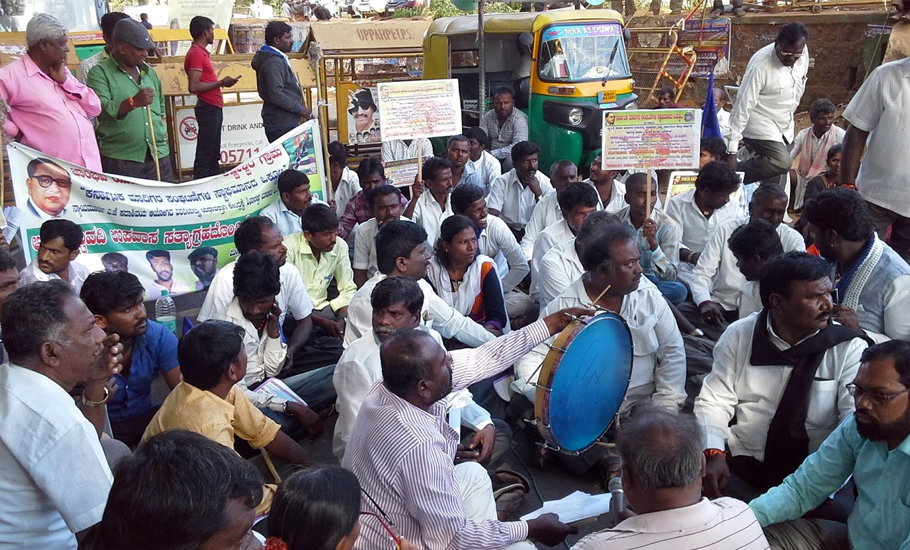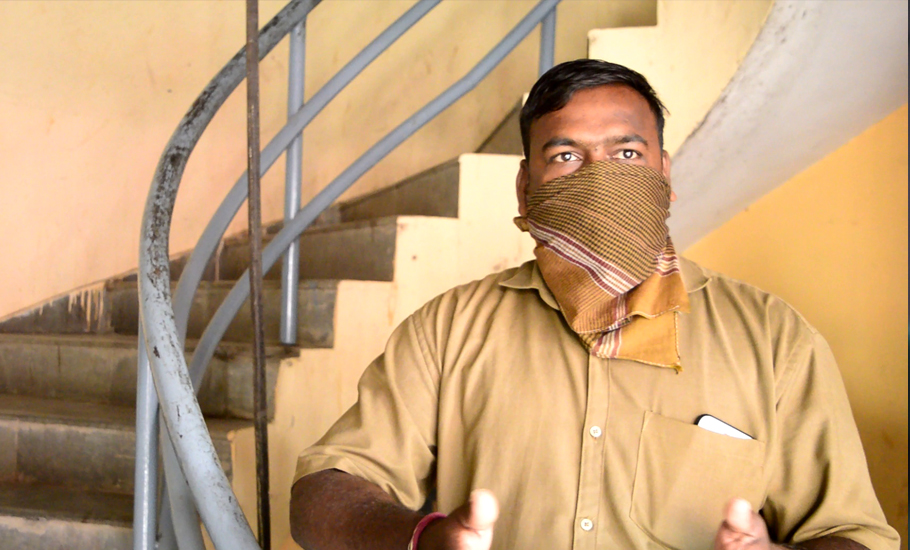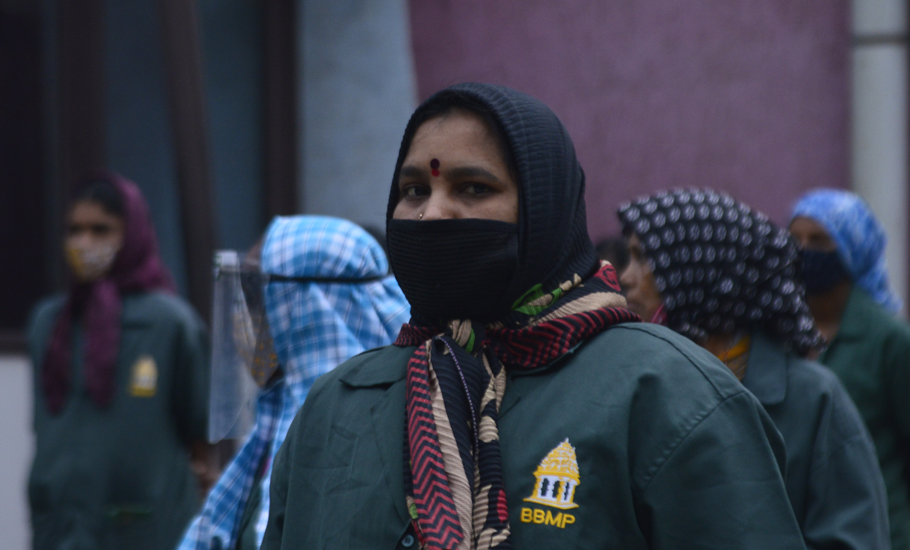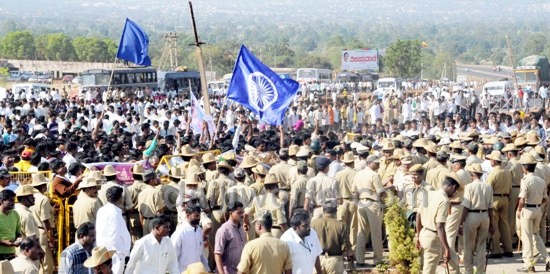
- Home
- News
- Analysis
- States
- Perspective
- Videos
- Education
- Entertainment
- Elections
- World Cup 2023
- Features
- Health
- Business
- Series
- Economy Series
- Earth Day
- Kashmir’s Frozen Turbulence
- India@75
- The legend of Ramjanmabhoomi
- Liberalisation@30
- How to tame a dragon
- Celebrating biodiversity
- Farm Matters
- 50 days of solitude
- Bringing Migrants Home
- Budget 2020
- Jharkhand Votes
- The Federal Investigates
- The Federal Impact
- Vanishing Sand
- Gandhi @ 150
- Andhra Today
- Field report
- Operation Gulmarg
- Pandemic @1 Mn in India
- The Federal Year-End
- The Zero Year
- Premium
- Science
- Brand studio
- Home
- NewsNews
- Analysis
- StatesStates
- PerspectivePerspective
- VideosVideos
- Entertainment
- ElectionsElections
- Sports
- Loading...
Sports - Features
- BusinessBusiness
- Premium
- Loading...
Premium

Madigas' fight for equitable quota benefits shows caste still rules in India
Till date, the reservation benefits under the Scheduled Caste category has been skewed against the Madigas in Karnataka and Andhra.

Harijana Nagendra Harijan, 37, migrated from Andhra Pradesh’s Gorantla to Bangalore about 15 years ago. Unable to find a job in the city, like many of his community members, Nagendra ended up working as a sewage and tank cleaner. Today, he’s hired by the sewerage board (BWSSB) and residents of Bangalore on a contract basis for sewer cleaning in the city. Occasionally, he still resorts...
Harijana Nagendra Harijan, 37, migrated from Andhra Pradesh’s Gorantla to Bangalore about 15 years ago. Unable to find a job in the city, like many of his community members, Nagendra ended up working as a sewage and tank cleaner. Today, he’s hired by the sewerage board (BWSSB) and residents of Bangalore on a contract basis for sewer cleaning in the city. Occasionally, he still resorts to manual scavenging, though banned in India, at least twice or thrice a month as he’s left with no other choice. His wife works as a garbage picker in the city’s municipal corporation.
Having studied till Class 10, Nagendra says poverty forced them out of the village, and when they landed in the city, they were willing to take up any job that came their way. But considering the caste legacy, he says many ended up as waste pickers and sewer cleaners in the early 2000s, when the Bangalore municipal corporation was expanding and hiring people.
“The land that we have is barren. We need at least ₹3 lakh to dig a borewell and start cultivating. Arranging such a huge amount will be difficult. So, going back to the village and getting back to farming is not an option for me,” says Nagendra. Had they stayed back in the village, they would not even have gotten this job, he adds.
“In those days, people gave nice jobs only if we came through referral (influential person). We knew none and got no good job. We were offered no other job except this.”
Nagendra belongs to the Madiga community, one of the 101 sub castes within the Scheduled Caste category in Karnataka. Till date, in many parts of Karnataka, Andhra Pradesh and Telangana, they are treated as untouchables. There are State Assembly Committee reports, Supreme Court judgments and Scheduled Caste Commission reports that indicate that the community hasn’t gotten their due and that the reservation benefits are skewed.
“Till about a decade ago, people used to separate us and treat us as outcasts. But now the situation has changed. Since people want their houses or toilets cleaned, they tend to behave better,” Nagendra says.
Although the government planned to rehabilitate the manual scavengers and end the oppression, training programmes designed for them only taught them how to clean tanks and pits wearing safety precautions. While Nagenra thought the training would be something that would get him out of the manual scavenging profession, the rehabilitation programme failed its purpose. The government’s financial assistance package of ₹50,000 too never reached him, he says.
“We will leave our job if certain help from the government or citizens’ groups come in. We need some capital to start another profession,” he says.

Nagendra wants to ensure that his children, studying in a private school, do not end up getting in this profession. He wants his kids to claim the reservation benefits and get a better job, and not get into his line of work.
“We are working hard to ensure that they do not get into this difficulty. I have one daughter who is 15 years old and a son who is 12 years old. We have to pay ₹70,000 for them to study.”
But Sujatha S, another contractual worker in the city’s municipal corporation (Bruhat Bengaluru Mahanagara Palike), belonging to the Madiga community, feels that oppression continues even today. She migrated from Yallampalli in Bagepalli taluk of Chikkaballapura district.
“When we ask for water, some residents do not give us water unless we carry a bottle. Even if they do, they would stand afar and give us water. And the COVID-crisis only deepened this behavioural trend,” she says.
Sujatha feels that if reservation in education and employment had worked as planned, it would not have resulted in continued oppression.
While there is no government data, independent surveys and civil society groups claim that 97 percent of the garbage cleaners engaged by BBMP are from the Madiga community.
Struggle for reservation benefits
Madigas have been fighting for equitable reservation rights since the 1970s. But their struggle and movement picked up steam in the late 90s. In 1997, Madiga Dandora organised a mass agitation in Bangalore urging the government to provide quota (reservation) on the basis of the population of Madigas and its sub-castes in Karnataka.
Similar protests erupted in undivided Andhra Pradesh. In 2000, the Andhra government under N Chandrababu Naidu passed the ‘Rationalisation of Reservation Act’ to categorise SCs on the basis of population. This was to ensure equitable reservation benefits for the Madiga community.
But that was challenged by EV Chinnaiah in the high court of Andhra Pradesh. The HC upheld the Act. Not satisfied, Chinnaiah challenged the same in the Supreme Court, which in 2004 set aside the Act on two grounds — (1) apportionment of reservations to Scheduled Castes to sub-groups within the castes cannot be done by the state legislature, only the Parliament is competent to do so; 2) even Parliament does not have the power to do so since Constitution has intended that Scheduled Castes and Scheduled Tribes are indivisible homogenous entries.

In light of this observation, and to ensure that certain castes groups are not neglected, the Andhra Pradesh Legislative Assembly again passed unanimous resolution on December 10, 2004 recommending the government of India to take up the matter in the Parliament for enabling sub-categorisation of various castes, tribes or races of Scheduled Castes by the state.
On March 9, 2006, the Cabinet Committee on Political Affairs considered the matter and decided that a commission be appointed to examine the matter in all its aspects. Finally, on May 19, 2007, a commission headed by Justice Usha Mehra, a retired judge of the Delhi High Court, was set up.
The argument was that Malas (sub-caste within the SC) enjoyed a lion’s share of the Scheduled Caste reservations, so they must be restricted to access reservation benefits.
In a petition in the Supreme Court, it was argued that in the undivided AP, Relli and Madiga together formed 50.21% of the Scheduled Castes whereas Mala and its allied castes formed 42.78%, but Mala and its allied castes enjoyed 70% representation in Class I and Class III posts in the state services.
Although Madigas were in higher proportion in Andhra Pradesh, the benefits were largely taken by the Malas. For instance, as per the SC affidavit in 2008, Malas had 51.39 lakh population and Madigas 60.74 lakh, but nearly 60-80 percent of the SC reservation benefits — in educational institutions, public sector undertaking, state secretariat, IPS posts, deputy collector and magistrates — were taken by Malas.
The Mehra Commission submitted a report in 2008 and asserted that the Malas and their allied castes mostly benefited from the reservations both in education and administration. And as the state looks after the development of the Scheduled Castes, it holds that states should have the responsibility to safeguard the interest of those being discriminated against and bring them on par with the other castes in the society. “In this process, the state is free to allocate the percentage of reservations for their development,” the commission observed.
In the meantime, the Karnataka government, too, formed the Justice Sadashiva Commission in 2005 to look into the internal reservation among the Scheduled Castes. The Commission broadly reclassified all the 101 castes into four groups and recommended 6 percent reservation for Madigas in government jobs.
The Commission report stated that a few in the name of all Dalits misappropriated the benefits of reservations and that it violated the constitutional goal of achieving social and economic justice. There were also demands that Vaddar (Bhovi), Lambani (Banjara), Koracha and Korama castes that were relatively forward as compared to Dalits such as Madigas, be stripped of SC benefits. Retired Justice Sadashiva noted that the earlier Supreme Court judgment on this issue suppressed the growing aspirations of the most-excluded castes among Dalits across the country.

Following the Sadashiva Commission report, Madiga community members organised a mass protest and tried to storm into the Suvarna Soudha in Belagavi where the winter session of the Karnataka legislature was being held in December 2012. However, the police charged them with lathis and shunted them out of the place with tear gas shells.
The Madiga Meesalathi Horata Samiti or the Madiga Reservation Struggle Committee demanded the state to implement the Sadashiva Commission report on special quota for different Scheduled Caste communities and forward it to the Union government for approval.
Despite the reports by the Mishra Commission and the Sadashiva Commission, the Centre never acted on it. And the state feared a political fallout in the event of delisting some of the Scheduled Castes that largely got reservation benefits.
Rekindling sub-category reservation debate
Now, with the Supreme Court in August ruling in favour of the Arunthathiyars in Tamil Nadu (treated on a par with Madigas in Karnataka) and upholding the right of state governments to allot sub-quota to communities like theirs within the SC category, the debate on reservation for various sub-castes has popped up again. The five-judge bench headed by Justice Arun Mishra has referred the matter to a larger bench though.
Across Andhra, Telangana and Karnataka, various demands are placed before the government and not to delay the justice. They seek the states to pass resolutions and take up the matter with the Centre.
Ambanna Arolikar, president of ‘Nyayamurthy AJ Sadashiva Ayoga Varadi Jaari Horata Samanvaya Samit’ (Justice AJ Sadashiva commission report implementation struggle coordination committee) — which comprises members of Madiga, Samagar, Chammar, Mochi and 58 other sub-castes — said it is time for the government to step up otherwise they would launch a nationwide agitation.
Deputy Chief Minister Govind Karjol and the Social Justice Department have called for a meeting on September 10 to discuss the issue. “Depending on the government’s stand, we will step up our fight,” says Arolikar.
When the community members raised their concern, Karjol who belongs to the Madiga caste, appealed to his people not to get into an agitation mode.
“When the government gave 10 percent reservation to Brahmins, or proposed to include Bangladeshi Hindu migrants (refugees) in the SC category, we did not protest. We are only asking for a fair share, which the government should look into considering the socio-economic conditions,” Arolikar says.
According to him, only ‘touchables’ and those with political power within the SC category are progressing and that a majority of the sub-groups have not gained reservation benefits.
Reservation, Arolikar says, is not liberation, it’s just upliftment. How can a group progress if for 70 years their rights have been denied? That 70 years of loss has to be offset in the next 10 years, he adds.
“We are in ICU and the government needs to attend to us first. It cannot wait to diagnose and treat us (our problems) with all other patients (castes). With increased privatisation, anyway the reservation benefits are less. But let us at least get what is due to us.”

